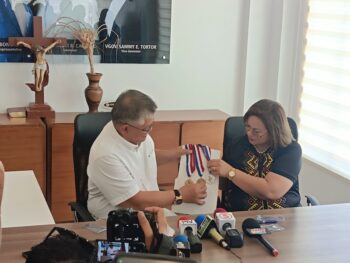SINAYAWAN, Valencia City (MindaNews/18 September) — The government must find a way to replace the substandard organic fertilizers distributed by the National Irrigation Administration ( NIA ) to farmers in Northern Mindanao in 2009 and 2010, Judy Arota, president of the Federated Lateral G Irrigators Associations in Valencia City, said.
But Arota said the replacement stocks should come from another source, not from 3K and C, supplier of the P30 million organic fertilizer distributed by NIA 10 in three phases since 2009 supposedly to help boost capacity of their irrigators association.
The firm, based in Bayugan, Agusan del Sur, is owned by Carlos Salazar, the NIA administrator at the time of the project.
“It cannot be from the same source because maybe they would give substandard fertilizers again,” Arota said.
Francisco Matulac, who works with NIA-Bukidnon for a techno-demo farm for organic fertilizers, admitted he is dismayed by what happened to the investigation.
He said he is open to the withdrawal and replacement of organic fertilizers, as recommended by the Department of Agriculture investigating team in September 2010 but “government should ask for refund from the supplier so it could use the fund to buy fertilizers from other suppliers.”
Ildefonso Natingga Jr, NIA 10 organic rice demo farm officer, told MindaNews the agency’s organic rice farming demonstration efforts continued in 95 sites in Northern Mindanao even after the discovery of the substandard organic fertilizers.
“Farmers are beginning to value the advantages of organic farming even with what happened,” he said. But Natingga added they are now using another kind of organic fertilizer, not the one distributed by 3K and C.
He said he used the 3K and C organic fertilizers during its first phase in his demonstration farms.
He declined to comment on the ill-fated project even if he said he is NIA-10’s “organic fertilizer man.”
Valencia City-based MLB Enterprises tapped Bayugan-based 3K and C to supply the fertilizers.
The investigation, conducted when the P9.55 million second phase of the three-phase project was already distributed, was urged by the Provincial Board of Bukidnon through board member Glenn Peduche.
Peduche in June 2010 questioned the procurement process, the quality, the supplier, and the price of the fertilizers distributed to at least a thousand irrigators in Northern Mindanao, mostly in Bukidnon, using funds from the Department of Agirculture’s (DA) Ginintuang Masaganang Ani (GMA) – Rice Program.
The DA’s legal office in the national level created a fact-finding team in July 2010. The team submitted its report to Agriculture Secretary Proceso Alcala in September 2010. But Peduche, now a city councilor here, received a copy of the report only on August this year.
The procurement went through a bidding process completed on January 26, 2010 but there were lapses in the post-qualification stage, the fact finding team cited in its 18-page report, 14 of which are attachments.
Peduche urged Alcala to act fast on the recommendation of the DA fact-finding team for possible replacement of fertilizers “so the farmers can benefit from it, after all”.
The fact-finding team’s report was silent on the allegations of over pricing and also on the problem of propriety raised against 3K and C Enterprises, producer of fertilizers for MLB Enterprises.
It was also silent on prosecuting those responsible for the purchase and distribution of the sub-standard fertilizers.
The report said only one firm submitted a bid, MLB Enterprises, which was later awarded the P9.555 million contract as the “single lowest calculated and responsive bid.” But the team reported the BAC did not conduct actual site inspection on the bidder or its suppliers during the post-qualification stage of the procurement process.
“The post-qualification was only limited to the legal, technical, and financial documents submitted by MLB Enterprises.” The team also reported that NIA, the procuring entity, did not conduct testing and inspection as to the quality of the ordered fertilizers upon delivery.
“The goods were inspected and received based only on quantity and not on quality,” the three member fact-finding team led by Roxana Hojas, DA-10 regional technical director for operations, said in their report.
The contract provides that the firm will deliver 11,000 bags of organic fertilizer and 14,625 liters of “foliar liquid fertilizer cum pesticide” within 20 calendar days to the NIA’s Bukidnon Irrigation Management Office in Bagonta-as, Valencia City.
It was not clear if the contract, a copy of which was posted on the internet (http://www.dgmarket.com/tenders/np-notice.do~4780857#), was for the third phase.
On July 23, 2010, investigators took samples from a portion of the undistributed stocks of fertilizers of the project in the NIA warehouse here. They found out that the samples tested did not comply with the required NPK (Nitrogen, Potassium, and Phosphorus) specifications as printed on the labels in the bags.
The results, they said, show that the fertilizers purchased did not meet the specifications of the procuring entity “hence should have not been accepted and paid for.”
The team also noted that NIA inspectors “failed to notice the very glaring fact that the packaging of the organic fertilizer did not indicate the FPA registration number, which is the standard.
The report also said the NPK content printed on the label of foliar fertilizer cum pesticide was not in compliance with specifications in the bidding.
The resolution awarding the contract to MLB Enterprises also did not have a number, which a BAC official from the provincial government of Bukidnon said is irregular because it is used to monitor the process.
The fact-finding team also noted that the NIA BAC should have allowed another bidder who bought bid documents, People’s Agri Service and Supply, to participate in the bidding so as not to defeat the purpose of Republic Act 9184 or the Government Procurement Reform Act, which pushes as much as possible for competitive bidding, especially when there are only two bidders. The other firm’s bid was not accepted because it came 10 minutes beyond the deadline. (Walter I. Balane/MindaNews)
